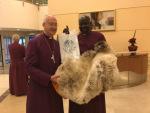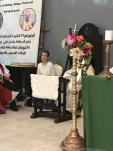
Sunday 31 July 2017
Yesterday the Archbishop of Canterbury led the four hour service that inaugurated the new (39th) Province of Sudan. Packed, joyful, chaotic (in the best and most enjoyable sense), it also saw the wonderful Archbishop Ezekiel Kondo installed as the first Primate of the new province. There are loads of photos and videos on Twitter, but I simply post here a photo I took – possibly the worst ever taken of an Archbishop of Canterbury at work.
Although the Inauguration was the primary reason for coming to Sudan, we did a lot of other stuff. We started off staying with the UK Ambassador who, despite being an excellent ambassador, turns out disappointingly to be an Arsenal fan. However, he is a fluent Arabic speaker, so the odd weirdness is forgivable.
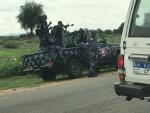
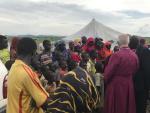
Sunday, however, did not only see loud and lively worship (visually obscured by unrestrained media and security men). In the early evening a small group of us went to visit the President of Sudan. We spent just under an hour in respectful but frank conversation about Sudan, its international reputation, the challenges faced by Christian churches, and other matters. It was good-humoured, but open. The demolition of churches was just one of the issues addressed, but so was the challenge to Sudan of continuing US sanctions.
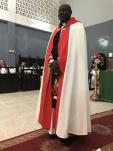
So, today continued the rounds. A Sudan roundtable meeting this morning raised questions about how the new Province should be supported – and how that support should be prioritised and coordinated – by external partner dioceses and agencies. I had to leave with Archbishop Ezekiel after two hours as we had to join the Archbishop of Canterbury’s group at a series of meetings with government ministers.
At each of these meetings – with the Governor of Khartoum State, then the Foreign Minister, and finally with the Minister of Guidance and Endowment (religious affairs) – the Archbishop raised matters of concern alongside discussing wider political and economic issues. It was both wide-ranging and focused, and questions of religious discrimination, demolition of churches, freedom of religion, etc. were all discussed honestly and respectfully.
The trip basically concluded with a dinner laid on by the UK ambassador at his residence. A number of ambassadors and diplomats joined in a serious discussion about Sudan, its challenges and gifts, and its potential futures. A big question haunting most conversations during the trip emerged again: the need for the United States to lift sanctions against Sudan on 12 October. The UK Government supports this, believing the three-month extension from 12 July must be the last. Interestingly, it wasn’t just the economic cost (or political pressure) that dominated the discussion; rather, it was the potential loss of hope by ordinary Sudanese that would prove most damaging. Of course, it is easier to measure economic impact than psycho-social despair.
This probably doesn’t read as very exciting. I write it mainly in order to keep a record of it. But, I also need to demonstrate that the agenda of the Church runs wider than the issues it is normally associated with in the media. Poverty, reconciliation, economics and politics go to the heart of the Christian gospel, and there can be no abstract discussion of such matters without an intelligent, informed, questioning and serious engagement with the people involved – both the powerless and the powerful.
The Archbishop moves on to Uganda tomorrow morning. I return to the UK on Wednesday, flying out of Khartoum late tomorrow night.
